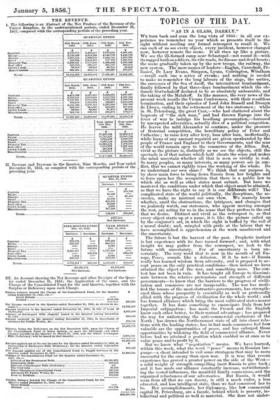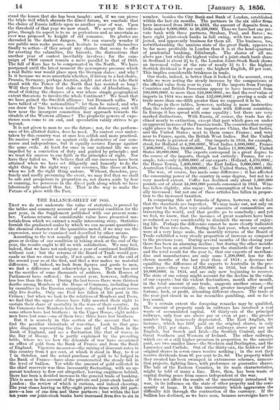TOPICS OF THE DAY.
" AS IN A GLASS, DARKLY."
WE turn back and scan the long vista of 1855: in all our ex- perience we remember no year which so presents itself to the sight without needing any formal retrospect to recall it. We can each of us see every object, every incident, however changed now, however remote the scene. It all rises up like a picture. We see the ill-formed camp near Sebastopol-not round it-with its ragged hiltless soldiers, its vile roads, its disease and dead beasts ; the scene gradually taken up by the new troops, the railway, the
limier, De Lacy Evans, Simpson, Lyons, C • on, Windham
-recall each one a series of events ; and no • is needed new system. The mere names of leaders- lan, 1Canrne Canrobert, Pe- Ralnie to make us remember the long labours of the siege, the sorties, the successes of the Sea of Azoff, the intermittent bombardment, finally followed by that three-days bombardment which the ob- durate Gortschakoff declared to be so absolutely unbearable, and the taking of the Malakoff. In like manner, the very news of the present week recalls the Vienna Conferences, with their resultless termination, and their episodes of Lord John Russell and Drouyn de Lhnys, ending in the retirement of the two statesmen ; while in St. Petersburg, the great Czar,-who had chattered about the bequests of " the sick man," and had thrown Europe into the fever of war to indulge his headlong presumption,-harassed by unexpected adversities, actually dies of a political congestion. He leaves the mild Alexander to continue, under the pressure of fraternal competition, the hereditary policy of Peter and Catherine ; to raise levy iifter levy, loan after loan, ineffectually, while loans of any amount required are given openhanded by the people of France and England to their Governments, and the seas of the world remain open to the commerce of the Allies. But, vivid as the picture is, distinctly as we see the objects, still the spectacle is of that nature which half cheats the sense and makes the mind uncertain whether all that is seen so vividly is real. So many peoples, so many interests, so many powers are in con- flict, that we cannot rightly trace the working of the whole. Do we understand our own share ? We think that our p is by sheer main force to bring down Russia from her heights an to force upon her the recognition that there is a public law to which she as well as other states must submit. But have we mastered the conditions under which that object must be attained, so that we have the right to say it is our deliberate will? The complicated state of the world politically, the 'deceptions, the se- cremes, make us mistrust our own view. We scarcely know whether, amid the obstructions, the intrigues, and changes that we jealously watch, our statesmen, who appear moving amongst the rest, are acting for us. in the sense that they profess to the end that we desire. Distinct and vivid as the retrospeot is, so that every object starts up at a name, it is like the picture Called up by the conjuror's art, in which the sight is baffledby the veil of a moral doubt ; and, mingled with pride at the labour that we have accomplished is apprehension at the work unachieved and the uncertainty.
The future is but the harvest of the past. Prophetic instinct is but experience with its face turned forward ; and, with what insight we may gather from the retrospect, we look to the future with uncertainty. For of uncertainty is born un- certainty. The very word that is now in the mouth of all Eu- rope, Peace, sounds like a delusion. If it be not-if Russia really has learned wisdom from adversity, and is prepared to ac- cept peace on the only practical conditions-then indeed we have attained the object of the war, and somethini more. The coil- test has not been in vain. It has taught all Europe to discrimi- nate between the relative pretensions and strength of different governments-to know that the barriers to the progress of civili- zation and commerce are not insuperable. The war has modi- fied the tenure of the most obstructive governments, has strength- ened those whose prosperity is essentially as well as professedly allied with the progress of civilization for the whole world ; and has formed alliances which bring the most cultivated states nearer together. It has done something to emancipate Italy from her Imperial subjugation ; has made the French and the English know each other better, to their mutual advantage ; has prepared the way for unfastening the anti-commercial exclusions of the North ; has drawn the Northernmost state of all into closer rela- tions with the leading states ; has in fact made commerce feel how valuable are the opportunities of peace, and has enlarged those opportunities by widening the field of commercial alliance. Never before had we attained a position which enabled us at once so to value peace and to profit by it. But we know what " negotiation" means. We have learned, within this week, what the word " peace" means in Russian lan- guage-a cheat intended to veil some stratagem that may be more successful for the enemy than open war. It is true that recent experience has proved a greater power on the side of the West- a solid weight of strength compelling inert Russia to give back ; and it has made our alliance constantly increase, notwithstand- ing the vested influences, the manifold family connexions, and the organized reluctances of our adversaries. But Russia, it would seem-from all that we can descry, is still a much ruder, a less educated, and less intelligent state, than we had conceived her to be. Her accomplishments, her diplomacy, like he commercial capital St. Petersburg, are a facade, behind which is poverty, in- tellectual and political as well as material. She does not under- stand the lesson that she has been taught: and, if we can pierce the triple veil which shrouds the direct future, we conclude that the choice of Russia inflicts upon us another year of war. Upon the threshold of that year we now stand. We accept the enter- prise, though its aspect is to us as portentous and as uncertain as ever was proposed to knight of old romance. Its glories are shrouded in the darkest dangers. We can scarcely wonder if
oifiLlublie men make pause, and hesitate to commit themselves y to action—if they accept any chance that seems to offer for averting the calamities, the hazards, the distractions that another year of contest inevitably involves ; for the cam- paign of 1856 cannot remain a mere parallel to that of 1855. The fall of Kars has to be compensated in the North. We have postponed until the latest moment the peremptory pressure which a real Baltic war would place upon the German states : and why ? Is it because we were uncertain whether, if driven to a last choice, Prussia, Germany, perhaps Austria, might not elect to take their stand with the Power of the North that has resisted so long ? Will they throw their last stake on the side of Absolutism, in- stead of risking the chances of a war whose simple geographical extent threatens to involve the whole Continent? We boast that we have gained the Swedish alliance : but Denmark sulks. We have talked of "the nationalities " : let them be raised, and who can draw the line between nationality and democracy, and tell how near the insurgent commotion may approach towards the citadels of the Western alliance ? The prophetic powers of expe- rience soon come to an end, and speculation vainly strives to go beyond.
It is not given to man to see the future ; nor, for the perform- ance of his allotted duties, does he need. No contest ever under- taken by this country was at once less selfish and more practical. Its success will secure us against evils destructive of our com- merce and independence, but it equally secures Europe against the same evils. At least for once in our national life we are impelled by a conviction of duty. and guided by principle ; and we trust for success to our faith in the principles of right. Nor have they failed us. We believe that all our successes have been attained when we have set diligently and honestly to do the right thing in the right way; our reverses, like those at Kars,
ri when we left the ght thing undone. Without, therefore, pro- fanely and madly presuming the event, we may feel that we shall be safe and prosperous in proportion as, not drawn aside by fear or cunning, we persevere in the direct path along which we have • laboriously advanced thus far. That is the way to make the Future of a piece with the Past.











































 Previous page
Previous page